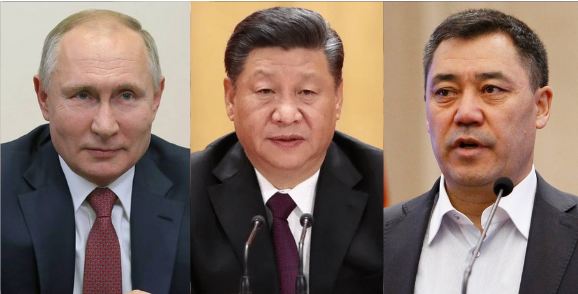China is in for a ride in Central Asia, as former Soviet Republics consolidate in their support for Moscow while giving Beijing a cold shoulder. The latest entrant to the elite club of Central Asian countries which have distanced themselves from China is Kyrgyzstan. On Sunday (GMT+6), the people of Kyrgyzstan will be voting for a constitutional referendum, which if approved by the electorate, would grant sweeping powers to the President and dilute the parliamentary democracy that the former Soviet Republic currently is. Essentially, Kyrgyzstan is all set to transform itself into a presidential democracy, at the behest of Russia.
The people of Kyrgyzstan are extremely supportive of the idea that their President must reign supreme in the country – even above the parliament. Having been the only country in a region ruled by authoritarian leaders who adhered to the rules of parliamentary democracy, Kyrgyzstan has remained far behind its siblings. The country is impoverished, and Bishkek owes a bulk of its foreign debt to China. The citizens have grown tired of both parliamentary democracy and of Chinese influence, and are all set to kick both out of their country.
Sadyr Japarov – the President of Kyrgyzstan is spearheading the referendum for which the people of the country cast their ballots on Sunday. Japarov – a nationalist himself, had won an incredible mandate in the elections held in January this year after the former government led by President Sooronbay Jeenbekov was ousted by the people of Kyrgyzstan. Sooronbay Jeenbekov was pro-China and Sadyr Japarov is not. In fact, Japarov is a Russian loyalist and realises that the people of Kyrgyzstan too have tremendous goodwill for Moscow. At the same time, they have come to hate China for its predatory investments – a primary reason why Sadyr Japarov’s rise to power was aided by the people of Kyrgyzstan taking to the streets.
Sadyr Japarov, by bringing in the constitutional reform which Kyrgyzstan so desperately required, is making sure that China is not able to set foot in the country ever again. The new constitution will overturn the one adopted in 2010 that strengthened the powers of parliament. As reported by Nikkei Asia, under the new document, the president will be able to introduce laws and referendums, formerly the preserve of parliament, while maintaining veto power over proposed legislation. He will also have the power to appoint and dismiss cabinet members, judges, the prosecutor general and other key positions in the state apparatus.
Russian President Vladimir Putin is well aware of how China is trying to eat into Moscow’s exclusive sphere of influence. To the same effect, Putin had warned the Central Asian Republics recently when he unequivocally stated, “We will never tolerate [anyone] using Russia’s rich gifts to damage the Russian Federation.”
In fact, Kyrgyzstan’s condition and dependence on China, apart from Bishkek’s debt obligations to Beijing were major drivers of Russia not interfering to save the former President’s government in October last year. Moscow, quite visibly, has been extending its support to Sadyr Japarov and is therefore working to cull Chinese influence in Kyrgyzstan.
Interestingly, Moscow is obligated by a security treaty to prevent a total breakdown of government in the post-Soviet Republic of Kyrgyzstan. However, in October last year – when a complete breakdown did occur, Vladimir Putin decided not to interfere, thus aiding Sadyr Japarov’s rise as a populist President who is now merely returning the favour by turning Kyrgyzstan into a presidential democracy.
Read more: Sorry Xi Jinping, Putin has quietly taken down a pro-China regime. This time in Kyrgyzstan
Russia, after all, considers the five post-Soviet Central Asian Republics as its exclusive “sphere of influence”. And presently, China and Russia are competing for influence in Central Asia, as Beijing tries to eat into Russian space with its BRI investments. Therefore, Putin chose not to support a leader like Jeenbekov, who was openly warming up to China and opening up Kyrgyzstan for predatory Chinese investments. Mind you, a presidential format of government in Kyrgyzstan will likely see Sadyr Japarov, 52, reigning supreme in the country for quite a long time.
Sadyr Japarov is a pro-Russian leader. The people of Kyrgyzstan themselves are very supportive of Russia. As such, by the time the rule of Japarov ends, populism would have gripped every household of the former Soviet Republic, and all leaders henceforth will naturally support Russia and despise China. China’s ambitions of exerting influence in Russia’s backyard have thus backfired, and Putin and Japarov are now together ensuring that Beijing never tries acting out of its league ever again.
